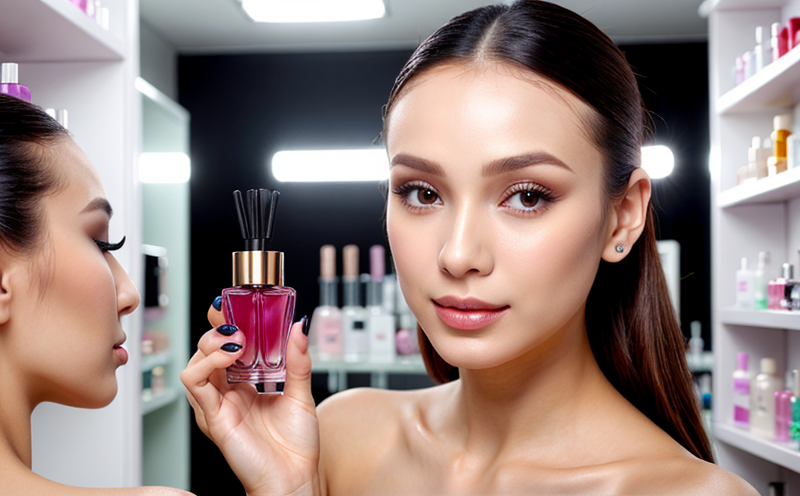Authenticity Testing of Natural Perfume Ingredients
The authenticity testing of natural perfume ingredients is a critical process in the cosmetics industry. This service ensures that the raw materials used to formulate perfumes and fragrances are genuine, pure, and free from adulteration or synthetic substitutes. Authenticity testing helps manufacturers comply with regulatory standards and ensures product integrity, which is essential for maintaining consumer trust.
The testing methodology involves a series of analytical techniques aimed at identifying and quantifying the natural components present in the ingredients. This process begins with specimen preparation, where the raw materials are carefully processed to ensure they are representative of their original form. The next step is instrumental analysis using advanced spectroscopic methods such as Gas Chromatography-Mass Spectrometry (GC-MS), High Performance Liquid Chromatography (HPLC), and Nuclear Magnetic Resonance (NMR) spectroscopy.
The analytical data obtained from these instruments are compared against a database of known authentic natural perfume ingredients. This comparison helps in identifying any deviations or inconsistencies that could indicate the presence of adulterants or synthetic substitutes. The results of this testing not only ensure product authenticity but also provide valuable insights into the quality and purity of the raw materials used.
For instance, GC-MS is particularly useful for detecting trace amounts of compounds that are indicative of natural ingredients. HPLC can be employed to assess the concentration levels of specific components within the ingredient. NMR spectroscopy provides detailed structural information about the molecules present in the sample, further aiding in confirming its authenticity.
Compliance with international standards such as ISO 17025 ensures that our laboratory adheres to rigorous quality control measures during all stages of testing. This includes proper calibration of instruments, standardized procedures for specimen preparation, and strict adherence to safety protocols. Our expertise lies not only in executing these tests accurately but also in providing comprehensive reports that meet the requirements specified by regulatory bodies like the European Union Cosmetics Regulation (EC 1223/2009).
In conclusion, authenticity testing of natural perfume ingredients is an indispensable aspect of ensuring product quality and safety. By leveraging state-of-the-art analytical techniques, we provide clients with reliable evidence supporting the true nature of their raw materials.
Why It Matters
The importance of authenticity testing in the cosmetics industry cannot be overstated. Ensuring that natural perfume ingredients are genuine and unadulterated directly impacts consumer health and safety, brand reputation, and market integrity. Consumers expect high-quality products that deliver on their promises without any hidden risks.
- Consumer Trust: Genuine ingredients enhance trust in the brand, fostering long-term customer loyalty.
- Regulatory Compliance: Meeting regulatory requirements prevents legal issues and ensures market access.
- Brand Reputation: Authenticity testing protects brands from potential damage caused by adulterated or synthetic products.
From a business perspective, ensuring authenticity reduces the risk of recalls and lawsuits while maintaining brand integrity. It also supports sustainable practices by promoting the use of genuine natural resources over synthetic alternatives.
In summary, authenticity testing is crucial for safeguarding both consumer health and business interests in the cosmetics industry.
International Acceptance and Recognition
The global nature of the cosmetics market means that compliance with international standards is paramount. The International Organization for Standardization (ISO) and other recognized bodies provide guidelines that ensure consistency across borders, promoting trust among consumers worldwide.
ISO 17025: This standard sets requirements for technical laboratories involved in product testing and calibration services. Compliance with ISO 17025 ensures that our laboratory meets the highest standards of quality management systems (QMS).
European Union Cosmetics Regulation (EC 1223/2009): This regulation mandates stringent controls on all cosmetic products sold within the EU, including rigorous testing procedures. Adherence to these regulations is essential for ensuring product safety and efficacy.
ASTM International: The American Society for Testing and Materials provides a wide range of standards applicable across various industries, including cosmetics. These standards help standardize practices globally, facilitating international trade.
The recognition of our laboratory by these bodies underscores our commitment to excellence in authenticity testing. By adhering to these stringent criteria, we guarantee that every test conducted meets the highest industry standards, thereby enhancing credibility and reliability for our clients.
Environmental and Sustainability Contributions
In addition to ensuring product quality, authenticity testing plays a significant role in promoting environmental sustainability. By confirming the natural origin of ingredients, we contribute positively towards reducing reliance on synthetic alternatives derived from non-renewable resources.
- Reduction in Synthetic Use: Authenticity testing encourages the use of genuine natural ingredients over synthetic ones, thereby minimizing the extraction of petroleum-based products.
- Support for Renewable Resources: Promoting the use of authentic natural perfume ingredients supports sustainable agricultural practices and helps conserve biodiversity.
- Eco-Friendly Manufacturing: Ensuring that raw materials are genuine reduces waste associated with mislabeled or adulterated products, contributing to cleaner manufacturing processes.
By integrating authenticity testing into our operations, we not only uphold ethical standards but also contribute meaningfully towards environmental stewardship. This commitment aligns with broader sustainability goals and helps drive positive change within the cosmetics industry.





